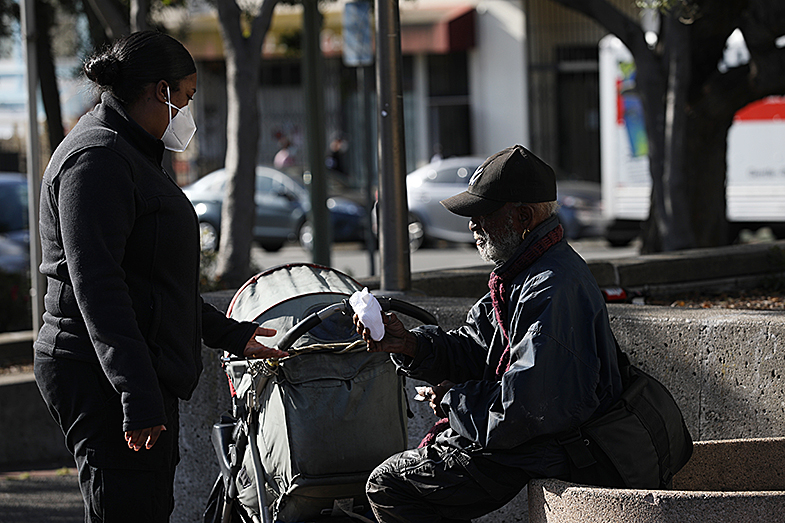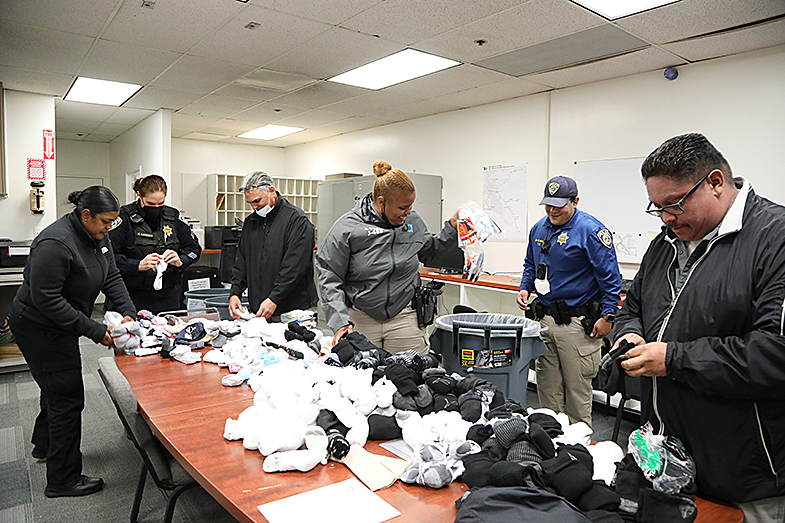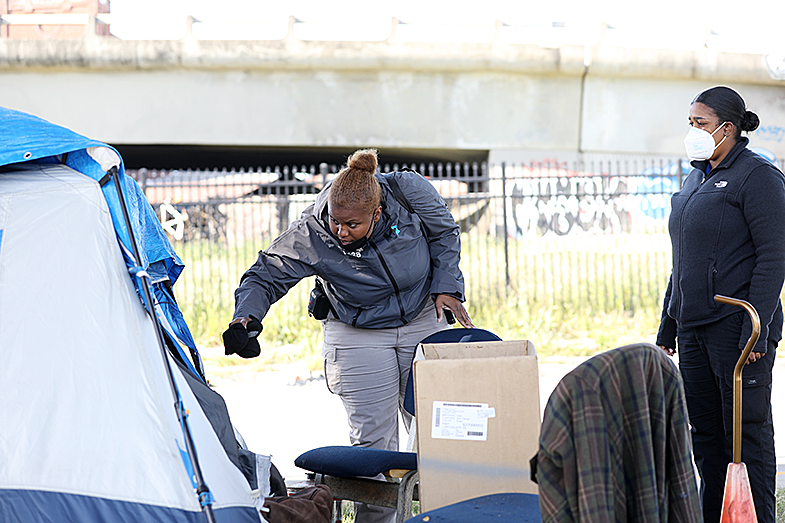‘A little gesture that means a lot’: BART PD’s Special Engagement Team gives out free socks to those in need
Socks. They’re not something many of us stop to consider on a daily basis. But when you’re unhoused, a pair of clean, warm socks can make a world of difference.
On Tuesday, the BART Police Department’s Special Engagement Team – consisting of police officers and Crisis Intervention Specialists (CIS) – fanned out across the Bay Area to personally deliver pairs of socks to individuals in-need. The 500 pairs of new, unworn socks were donated by BART employees in a community outreach effort spearheaded by BPD Community Service Officers Jonathan Moreland and Harry Matthews.
“Socks are one of those things most of us take for granted,” said Armando Sandoval, Supervisor of Crisis Intervention and Outreach Programs at BART. “We’re dealing with folks that have next to nothing, and they indicated to us that it’s one of the things they needed.”
CISes are an integral part of BART’s new Progressive Policing and Community Engagement Bureau, which recognizes that not every incident requires the response of an armed police officer. CISes – unarmed BPD employees with backgrounds in social services -- proactively walk platforms and ride trains to respond to reports of individuals experiencing mental health crises, drug issues, or a lack of housing. The goal is to make BART safer for everyone, and to connect those in need with the proper services.
Ontreal Wiltz joined BART as a CIS just three weeks ago. Even in that short time, she’s recognized the importance of her role. Many of the people she serves already know her by name.
“We oftentimes see the disconnect between law enforcement and the public, and I feel honored to serve as a middleman between them and to continue to support people in the community,” Wiltz said as she matched like-colored socks.
“I’m separating the socks and I’m going to make them match because…I like matching socks,” she said. “It’s a little gesture that means a lot.”
Wiltz was joined by fellow CISes Amnesty Bradley and Remberto Calero, who were prepping the donated socks at BPD Headquarters before heading out into the community.
“It’s important to cover your feet,” Bradley pointed out as she sorted male and female socks into different piles. “That’s the first contact we have with the earth!”
As the CISes organized the socks into various piles, they spoke about the significance of “small gestures” in reaching out to the community. Sometimes, something as simple as giving a person a pair of socks is all it takes to build a lasting relationship.
“A little thing goes a long way,” Calero said. “It’s always good to have something on-hand.”
BPD Sergeant Catherine Lahanas, who joined the CISes in sock sorting, agreed with Calero. She said BPD is “constantly collecting” clothing items to give out to community members, whether it’s a gently worn jacket or a pair of new sneakers.
“We are always gathering items,” Lahanas said. “We basically need everything.”
At about 9 a.m., the CISes made their way to Lake Merritt Station. There, they scanned the platforms and adjacent Madison Park, where elderly folks exercised and basked in the sunlight, for people who might be in-need of a pair of fresh socks. Some folks shook their heads no or kept walking; others thanked the CISes and smiled.
As the CISes predicted, the socks served as an icebreaker between themselves and those they met outside, creating space for conversation and relationship building. Establishing such connections, the CISes stressed, is essential for connecting people with community services, such as housing, mental health support, or drug treatment.
“Anything else we can help you with today?” Wiltz asked a man sleeping in a tent. She then flourished two water bottles, which the individual accepted with gratitude.
According to Sandoval, "The Special Engagement Team is always making strong connections with people – because they follow up. Consistency is critical in building trust and bringing hope while navigating folks through the system.”
Last week, the team encountered an unhoused woman whose camp had burned down. She asked for help, and within minutes, the CISes connected her to the C.A.R.E.S. Navigation Center, an assessment and referral program created by the Alameda County District Attorney’s Office.
The C.A.R.E.S. Navigation Center was the last stop of the day for this group of CISes, who begin their shifts at 4 a.m. They handed the leftover socks to the C.A.R.E.S. team and took a moment to reflect on the day.
“We’re already seeing BART connect people to us!” said Jason Toro, the Director of Diversion and Reentry programs at C.A.R.E.S., in reference to the aforementioned unhoused woman. Late last week, the C.A.R.E.S. team successfully connected the woman with stable housing – a success story worth celebrating.
“I like giving back to our community,” said Bradley in conclusion. “No matter how small.”


